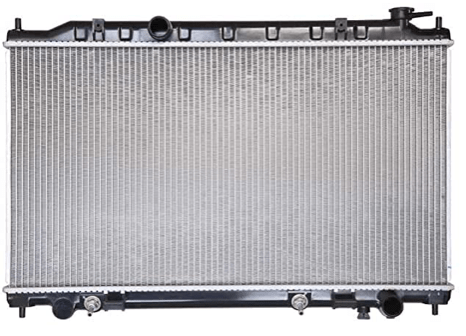Your vehicle’s cooling system passes antifreeze through the engine. The main parts of the system are the thermostat, radiator, water pump, coolant itself, and the hoses. If any of these parts go bad, you may experience a leak. A radiator leak is one of the most common reasons this system fails.
A radiator leak is very common. You should notice the leak directly under the radiator if you let the vehicle idle in the same spot for long enough. It should not appear under the engine itself. If that’s the case, you may be looking at a bad hose, water pump, or thermostat housing.
Keep a very close eye on your temperature gauge and coolant level. If enough coolant leaks out, you will overheat. Repairing or replacing the radiator should be considered an absolute priority.
Radiator Leak Symptoms
Here are the most common symptoms of a leaking radiator:
Coolant Under the Vehicle
You should find that there is coolant under the vehicle. It should be almost by where the bumper is. If it is further back, it could be the radiator hoses or thermostat housing that are leaking.
Overheating
When a radiator leaks, it’s best to replace it or have it repaired right away. As the pressure created by the water pump pushes coolant through the radiator, it’ll follow the path of least resistance, which is through the damaged part of the radiator. The leak will grow bigger
As the radiator leaks, it’ll cause the vehicle to overheat. Overheating can cause serious long term damage, such as a bad head gasket or cracked head.
Squealing Belt
Depending on where the radiator is leaking from, it can get coolant onto the serpentine belt. This can cause a loud squeal. That is the sound of the serpentine belt slipping from the coolant. This can lead to the engine accessories not turning fast enough to do their job.
White Smoke
As the coolant hits the hot engine or exhaust, it can cause white steam to shoot out from under the hood, even if you are not overheating.
Radiator Leak Causes
Here are some of the most common causes for a radiator leak:
Road Debris
The grill on a vehicle is designed to let enough air pass to the radiator that it is able to get enough air to cool the vehicle, while at the same time protecting against large debris. With enough time and mileage, the right rock, bolt, etc can get through and cause a leak.
Corrosion
As time goes by, your radiator can slowly fill up with sediment. This sediment can eventually knock a hole in the radiator over time. It doesn’t immediately happen. It happens slowly.
Bad Thermostat
If the thermostat has gone bad, it throws off the equilibrium of the cooling system. It can create a high pressure pocket, and cause the radiator to leak. The heater core can also go bad and throw off the pressure in the radiator, which will cause a leak.
Wrong Coolant
Always make sure to fill your radiator with the same exact coolant that the manufacturer recommends. The cooling system hoses, radiator, and seals are engineered to interact properly with the correct coolant. Using the wrong coolant can cause a radiator to fail and leak prematurely.
Radiator Leak Fix
The best way to fix a leaking radiator is to replace it. Radiators themselves are not crazy expensive. If you have a shop do it, there is a decent amount of labor. If you are going to replace the radiator, consider getting new hoses while you are at it.
There are a number of stop leak type products out there that can stop up a small leak. They are made of a pliable material (usually aluminum) that can seal up the leak. The problem is that they can also clog up water jackets and other cooling system parts, leaving it less efficient than it was before it started to leak.
Sometimes, it’s not in the budget to replace your radiator. In that case, a stop leak type product may be the only option.
Conclusion
A leaking radiator is serious business. If you are uncomfortable dealing with it, take it to a radiator repair shop right away. Good luck!

